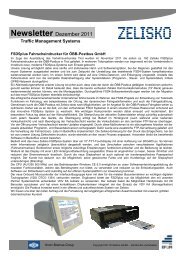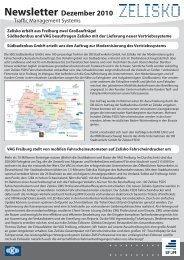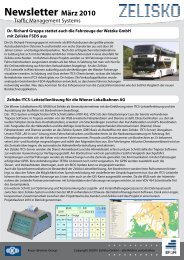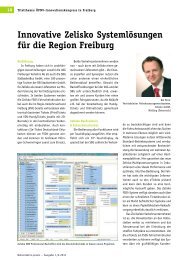Annual Report 2012 - Knorr-Bremse AG.
Annual Report 2012 - Knorr-Bremse AG.
Annual Report 2012 - Knorr-Bremse AG.
You also want an ePaper? Increase the reach of your titles
YUMPU automatically turns print PDFs into web optimized ePapers that Google loves.
14<br />
The State and Development<br />
of <strong>Knorr</strong>-<strong>Bremse</strong> <strong>AG</strong> and the<br />
<strong>Knorr</strong>-<strong>Bremse</strong> Group<br />
An overview of<br />
the <strong>Knorr</strong>-<strong>Bremse</strong> Group<br />
General<br />
economic developments<br />
The <strong>Knorr</strong>-<strong>Bremse</strong> Group is the world’s leading manufacturer<br />
of braking systems for rail and commercial vehicles.<br />
For more than 100 years now the company has pioneered<br />
the development, production, marketing and servicing of<br />
state-of-the-art braking systems. Other lines of business<br />
in the rail vehicle systems sector include automatic door<br />
systems, HVAC systems, control components and windscreen<br />
wiper systems, platform screen doors, friction material,<br />
simulators and driver assistance systems. In the<br />
commercial vehicle systems sector, the product range includes<br />
complete braking systems with driver assistance<br />
systems, as well as torsional vibration dampers and powertrain-related<br />
solutions, and transmission control systems<br />
for enhanced energy efficiency and fuel economy.<br />
The structure of the <strong>Knorr</strong>-<strong>Bremse</strong> Group is based on the<br />
regions Europe, North America and South America, and<br />
Asia/Australia, and the development of the Group is<br />
geared to meeting the specific requirements of the markets<br />
and customers in these regions.<br />
This regional organizational structure is designed to offer<br />
globally active customers uniform technical platforms<br />
worldwide, while at the same time taking specific local<br />
needs into account. It also ensures that customers who<br />
operate on a regional basis are supplied with globally<br />
proven systems and components.<br />
<strong>2012</strong> witnessed a slowdown in the economic recovery of<br />
the worldwide markets. Uncertainty about economic developments<br />
going forward prevented many market players<br />
from engaging in substantial investment activity. In<br />
overall terms, however, worldwide growth can be said to<br />
have continued at a modest pace, with marked differences<br />
in developments from one region to the next.<br />
While the pace of growth in emerging nations slowed<br />
compared to the rapid expansion of recent years, these<br />
markets continued to make the largest contribution to<br />
growth. In <strong>2012</strong>, the gross domestic product (GDP) of the<br />
emerging economies increased by 5.1% (2011: 6.2%)<br />
compared to average GDP growth of just 1.3% (2011:<br />
1.6%) for the industrialized nations of the world. Global<br />
figures showed overall economic growth of around 3.2%<br />
(2011: 3.8%).<br />
Following two years of growth, the economic performance<br />
of the Eurozone showed a 0.4% downturn in <strong>2012</strong><br />
(2011: +1.4%) owing to persistent economic difficulties<br />
encountered by the southernmost members of the EU.<br />
Countries that had previously been less affected, such as<br />
Italy and France, proved no longer able to contribute to<br />
overall stabilization, posting <strong>2012</strong> growth rates of -2.1%<br />
(2011: 0.4%) and 0.2% (2011: 1.7%) respectively. In Germany,<br />
the largest Eurozone member state in terms of GDP,<br />
while economic output slowed year-on-year, growth remained<br />
positive at 0.9% (2011: 3.1%).<br />
In the USA, economic growth showed a modest improvement<br />
from 1.8% in 2011 to 2.3% in <strong>2012</strong>. The final months<br />
of the year under review here were marked by tough negotiations<br />
between the political parties as they strove to<br />
avoid the “fiscal cliff” with its automatic dramatic tax in-



![1 Newsletter 2013 Version 0 92 [Kompatibilitätsmodus] - Zelisko](https://img.yumpu.com/50939577/1/184x260/1-newsletter-2013-version-0-92-kompatibilitaatsmodus-zelisko.jpg?quality=85)




![Backofficelösung ZMS [PDF, 740 kB] - Zelisko](https://img.yumpu.com/33964695/1/184x260/backofficelaasung-zms-pdf-740-kb-zelisko.jpg?quality=85)

![Geschäftsbericht 2012 [PDF, 13 MB] - Zelisko](https://img.yumpu.com/31517535/1/184x260/geschaaftsbericht-2012-pdf-13-mb-zelisko.jpg?quality=85)


![Produktkatalog Gesamtlösungen [PDF, 4 MB] - Zelisko](https://img.yumpu.com/22973479/1/182x260/produktkatalog-gesamtlaasungen-pdf-4-mb-zelisko.jpg?quality=85)
![ITCS Datenblatt [PDF, 804 kB] - Zelisko](https://img.yumpu.com/22855155/1/184x260/itcs-datenblatt-pdf-804-kb-zelisko.jpg?quality=85)
![Fahrscheindrucker FSD5plus [PDF, 934 kB] - Zelisko](https://img.yumpu.com/22822643/1/184x260/fahrscheindrucker-fsd5plus-pdf-934-kb-zelisko.jpg?quality=85)
